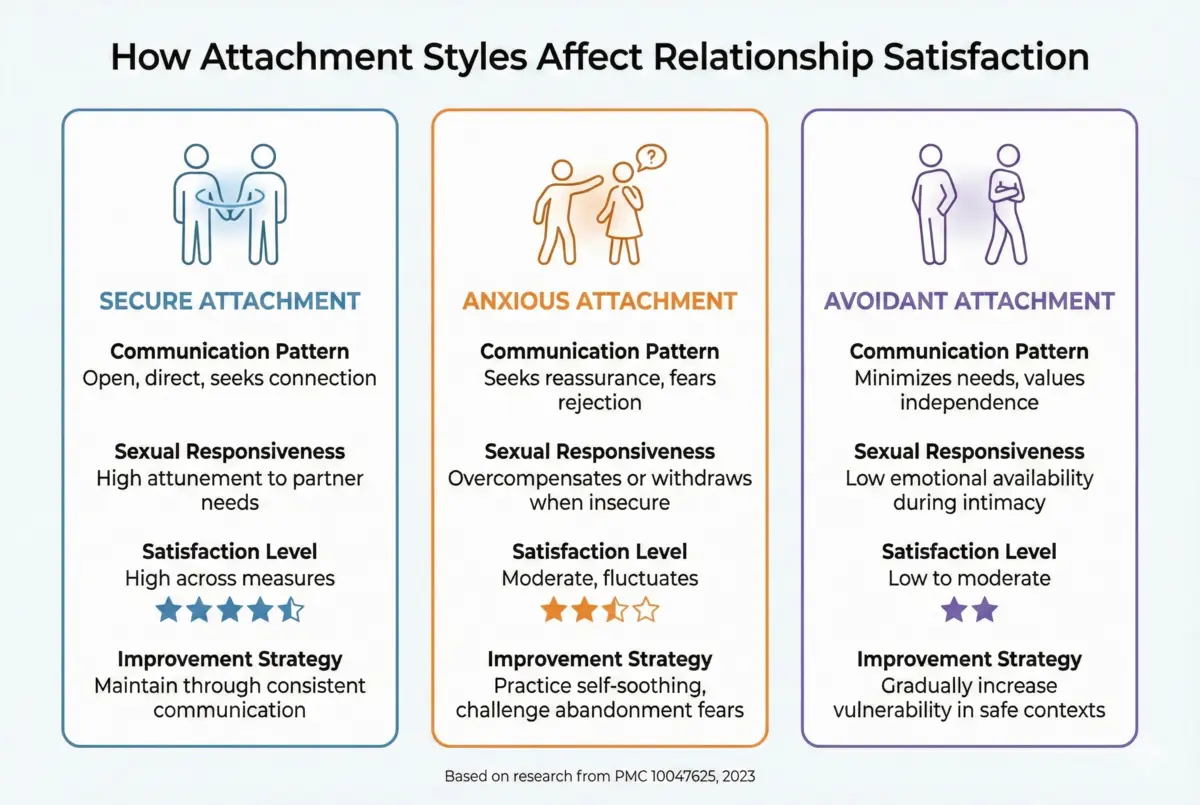How Sexual Responsiveness Impacts Relationship Satisfaction

Relationship satisfaction measures how content you feel with your partnership overall. Sexual responsiveness directly affects this level of satisfaction. Quality sexual communication matters 67% more than frequency for relationship satisfaction.
Meta-analysis of 93 studies with 38,499 participants confirms this finding. Understanding this connection helps you strengthen your intimate bond.
- Sexual communication quality correlates .52 with satisfaction, frequency only .31.
- 82% of married or partnered adults report relationship satisfaction.
- Intimacy behaviors and satisfaction reinforce each other over time.
- Secure attachment style predicts higher relationship quality across all measures.
- Your own communication patterns predict satisfaction more than your partner’s.
What Is Relationship Satisfaction?
Relationship satisfaction measures how content you feel with your partnership. It includes emotional connection, physical intimacy, and communication quality. These three dimensions work together to create overall relationship health.
A 2025 Ipsos survey found 82% of partnered adults feel satisfied. Millennials report the highest romantic and sexual satisfaction at 63%.
Income level also matters: 83% of high-income individuals report satisfaction. In comparison, only 67% of low-income individuals feel the same way.
Satisfaction is not static. It changes based on daily interactions, life stressors, and relationship maintenance. Your satisfaction today predicts your relationship behaviors tomorrow, creating a feedback loop.
The Link Between Sexual Responsiveness and Relationship Quality
Sexual responsiveness means tuning into your partner’s needs and desires. It requires balancing your boundaries with their preferences. This responsiveness directly affects how satisfied both partners feel.

Why Sexual Communication Matters More Than Frequency
Most couples believe frequency determines sexual satisfaction. The data tells a different story. A meta-analysis of 93 studies with 38,499 participants found quality trumps quantity.
Sexual communication quality shows a .52 correlation with sexual satisfaction. Frequency only correlates at .31. That makes quality 67% more predictive than how often you have sex.
What counts as quality communication? Three dimensions matter most:
Married couples show stronger correlations than dating couples. This suggests communication becomes more important as relationships deepen. Cultural context also plays a role: individualistic countries show stronger associations.
Subscribe to Create Higher Vibrations!
Get Inspiration and Practical advice straight to your inbox.
The Bidirectional Effect: How Satisfaction Feeds Itself
Research confirms a feedback loop between intimacy and satisfaction. A longitudinal study of long-term couples found bidirectional associations. Intimacy behaviors increase both sexual and relationship satisfaction. Higher satisfaction then promotes more intimate behaviors over time.
This creates either a positive or a negative spiral. Satisfied couples engage in more connecting behaviors. These behaviors further boost satisfaction. Dissatisfied couples avoid intimacy, which deepens dissatisfaction.
Daily patterns matter significantly. One study tracked 144 couples and measured daily fluctuations. Sexual satisfaction on Monday predicted relationship satisfaction on Tuesday. Relationship satisfaction on Tuesday predicted sexual satisfaction on Wednesday. The cycle continues, day after day.
A 2023 study in Current Opinion in Psychology examined sexual responsiveness benefits. Responsiveness requires considering both your needs and your partner’s needs. Too much focus on either side creates problems. Balance generates the best outcomes for relationship quality.
Gender differences exist in these patterns. For men, sexual satisfaction is the most central variable. For women, sexual desire holds more centrality. Both genders benefit when sexual well-being improves overall relationship health.
How Attachment Styles Shape Your Relationship Experience
Your attachment style forms in childhood and affects adult relationships. It influences how you communicate, respond to conflict, and experience intimacy. Understanding your style helps you identify patterns that hurt satisfaction.
Secure Attachment and Relationship Success
Secure attachment predicts higher satisfaction across all relationship measures. People with secure styles show greater trust, commitment, and interdependence. They experience more positive emotions and fewer negative ones.
A 2024 study found that secure attachment in one partner protects the relationship. It buffers the other partner’s insecurities and builds resilience. You do not both need secure attachment to succeed. One secure partner significantly improves outcomes.
Securely attached individuals seek social support during stress. They communicate openly about needs and boundaries. These behaviors directly improve sexual and relationship satisfaction.

Anxious and Avoidant Patterns
Anxious attachment involves fear of abandonment and a need for approval. People with anxious styles perceive more conflict in relationships. They often doubt their worthiness of love.
Avoidant attachment means discomfort with closeness and emotional intimacy. Avoidant individuals prioritize independence over connection. They suffer less after breakups but report lower satisfaction during relationships.
A 2023 study examined attachment style and psychological well-being. Attachment characterized by a need for approval strongly predicts lower well-being. This effect appears in both single people and partnered individuals.
The good news: attachment styles can shift with awareness and effort. Therapy helps people develop more secure patterns. Even small changes in communication improve satisfaction significantly.
Attachment Style Comparison:
| Style | Communication Pattern | Sexual Responsiveness | Typical Satisfaction | Improvement Strategy |
|---|---|---|---|---|
| Secure | Open, direct, seeks connection | High attunement to partner needs | High across measures | Maintain through consistent communication |
| Anxious | Seeks reassurance, fears rejection | Overcompensates or withdraws when insecure | Moderate, fluctuates significantly | Practice self-soothing, challenge abandonment fears |
| Avoidant | Minimizes needs, values independence | Low emotional availability during intimacy | Low to moderate | Gradually increase vulnerability in safe contexts |
Measuring Relationship and Sexual Satisfaction
Objective measurement helps you track progress and identify problem areas. Researchers use validated tools to assess satisfaction accurately.
The Sexual Satisfaction Questionnaire
The Sexual Satisfaction Questionnaire (SSQ) is a widely used assessment tool. It shows high reliability with a score of 0.85. This means consistent results across repeated testing.
The SSQ measures multiple dimensions:
Research shows these dimensions interact but remain distinct. You can feel satisfied with emotional connection, but dissatisfied with frequency. Measuring each dimension separately reveals specific improvement areas.
Key Indicators to Track
Beyond formal questionnaires, monitor these relationship health indicators:
Research from 2025 shows that couples who met online report lower satisfaction. A study of 6,000 individuals found that online-met couples experience less intense love. This highlights the importance of building a strong offline connection.

Five Ways to Improve Your Relationship Satisfaction
These evidence-based strategies work for most couples. Consistency matters more than perfection.
1. Practice Sexual Communication Daily
Talk about intimacy outside the bedroom first. Start with what you appreciate about your sexual connection. Then gradually introduce desires or concerns.
Use specific language instead of vague hints. Say “I enjoy when you…” rather than “You never…”. Focus on requests, not complaints.
Remember: your communication predicts your satisfaction more than your partner’s communication. Take responsibility for clear expression.
2. Prioritize Intimacy Behaviors Beyond Sex
A 2022 study found that intimacy behaviors predict future satisfaction. These include emotional disclosure, quality time, and physical affection.
Schedule 20 minutes of distraction-free conversation daily. Put phones away and ask open-ended questions. Physical touch without sexual expectation also builds connection.
Discover Your Inner Self. Join Our Self-Mastery Program.
Self-Mastery Coaching gives you the space, tools, and guidance to grow, reflect and discover your values and inner strength.

3. Address Your Attachment Patterns
Identify your attachment style and how it affects your relationship. If you have anxious patterns, practice self-regulation during triggering moments. If you lean avoidant, challenge yourself to share more vulnerability.
Therapy accelerates this work significantly. Even 8 to 12 sessions improve attachment security.
4. Shift Focus From Frequency to Quality
Stop comparing your sex life to arbitrary standards. Instead, assess whether quality meets both partners’ needs.
Plan intimacy when you both have energy and privacy. Quality requires presence and attention. Rushed encounters do not build satisfaction long-term.
5. Create Positive Feedback Loops
Small improvements in satisfaction lead to better behaviors. Better behaviors further increase satisfaction. Start the cycle by choosing one connecting behavior daily.
Examples include: compliment your partner, initiate affection, express appreciation, ask about their day with genuine interest, or suggest a shared activity you both enjoy.

When to Seek Professional Help
Some relationship problems require professional intervention. Consider therapy if you experience:
Sex therapists specialize in intimacy issues and communication patterns. Marriage and family therapists address broader relationship dynamics. Individual therapy helps when personal issues (anxiety, depression, trauma) affect relationship capacity.
Early intervention prevents problems from becoming entrenched. Couples who seek help sooner report better outcomes than those who wait.


